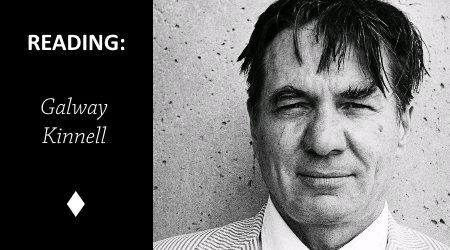Galway Kinnell (1927-2004) was an engaged, versitale and prolific American poet who won many awards (Pulitzer, National Book Award. I read a classing sounding poem, called the Feast:
The Feast
Juniper and cedar in the sand.
The lake beyond, here deer-meat smoking
On a driftwood fire. And we two
Reaching each other by the wash of blue
On the warm sand together lying
As careless as water on the land.The feast is sweet. Birds wheel round
The remnants of the food. Let us be dumb
This afternoon, not a gull’s loud Speech
Wakes these bodies from the drowsing beach;
But wake when waves hush and we have become
As two cliffs that are laboured to sand.The water stills. In the west the gold bars
Melt. We catch our breath to see the sunset
Renew the day on the reflecting lake.
And we who gave the sand a form now take
Its substance; and, between the day and night,
Awaken in the last light like evening stars.As the light is denied a creature speaks.
I think it is the stones that wear each other
To cold sand who put a voice in our silence,
Or else under the cliff a surf begins.
It tells of another evening, and another,
Beside lapping waters and the small lapped rocks.The sand grows colder, the ancient body warms.
If love had not smiled we would never grieve.
But on every landscape this turning crown
Flashes and fades. We will feast on love again
In the flaming light, and rise again and leave
Our two shapes dying in each other’s arms.
Over-the-top romanticism in the closing line? Observes Robert Langbaum: “like the romantic poets to whose tradition he belongs, Kinnell tries to pull an immortality out of our mortality.”
It begins with a nice peaceful scene at a lake, you can smell the deer-meat smoking. We are gonna play dumb, we become sand shapes, gained shape, lost substance. The water will come and destroy us but for the moment we enjoy.
Next: sunset. The gold bars melting in the West refers to the Gold Rush and the vacuity of men’s ambitions. The reflecting lake is a still, a moment that exists as a substance we have taken in the crepuscular intermezzo. When night falls, time flows again. The rubbing stones, the lapping water erodes the substance, but it gives us a voice at the same time. There is a transfer of substance from the sand to the ‘ancient body’, the substance that we have experienced during a passing moment, must exist somewhere. Our grievance is the flipside of a smiling love, somewhere, sometime, “But on every landscape this turning crown / Flashes and fades.” Somehow, the poet imagines how we will feast on love again lit by these ephemeral flashes. We will have become the substance that we glimpsed earlier, and can safely leave behind form. We have been forged to free form stones that accummulate their substance from our fickle experience. We leave to poet’s heaven, a dubdivision of Plato’s heaven that stubbornly demands the idea is substance, not form.
